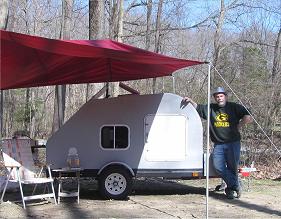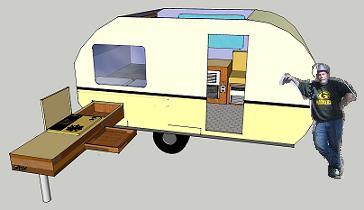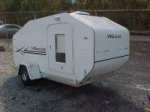I had an issue with my trailer lights. The turn signals and brake lights were working, but no running lights. I followed what I thought was a very methodical plan to diagnose the problem.
1. I purchased a test plug with 4 l.e.d.'s. Every light lit up exactly as it should , brake, both turns, and stop.
2. I checked the voltage at the plug on the car. Everything as it should be.
3. I inspected all the wiring. Everything appeared as it should.
4. I bought a new converter (separate tail and turn signals).
5. I cursed quite a bit since that didn't solve the problem.
6. I checked the voltage with the car plugged into the trailer, and no 12v on the tail light circuit.
7. Now in desperation, I start cutting wires going to the four side markers, thinking maybe there is a short.
8. Still not working, so cursing got louder.
9. With the car plugged into the trailer, I had no voltage on the tail circuit, but unplug the trailer, and the voltage was there.
10. I took out the tail light assembly, and removed the blue crimp connector that I had to connect the wires, cut the insulation off and soldered the wire.
11. I danced for joy!!!!
It made enough of a connection to power the l.e.d. test light, and the voltmeter, but with the draw of the lights it wouldn't work. Now I have to replace the other two crimp things, and reconnect and solder my four running lights.
If you used those crimpy things, you may want to replace them when it's convenient, and not find out at the worst time that they have failed.
Beware of little blue crimpy things
14 posts
• Page 1 of 1
Beware of little blue crimpy things
-- Paul --
Build Thread
http://www.tnttt.com/viewtopic.php?t=35787
2nd Build Thread
http://www.tnttt.com/viewtopic.php?f=50&t=47901


 http://www.teartime.com
http://www.teartime.com
Build Thread
http://www.tnttt.com/viewtopic.php?t=35787
2nd Build Thread
http://www.tnttt.com/viewtopic.php?f=50&t=47901
-

parnold - Donating Member
- Posts: 2344
- Images: 302
- Joined: Mon Feb 08, 2010 4:49 pm
- Location: Northwest New Jersey
I used to never have luck with those things until I started using them differently... Now when I use them.... (I mostly solder unless I'm feeling lazy) I will twist the wires together and stick both of them in the same end then crimp it then wrap it with tape. Haven't had an issue since doing it that way and its only 1 crimp per splice.
 You know a man is on the level if his bubble is in the middle.
You know a man is on the level if his bubble is in the middle.-

Wimperdink - 1000 Club

- Posts: 1058
- Images: 33
- Joined: Mon Sep 17, 2007 8:29 pm
- Location: East TN




